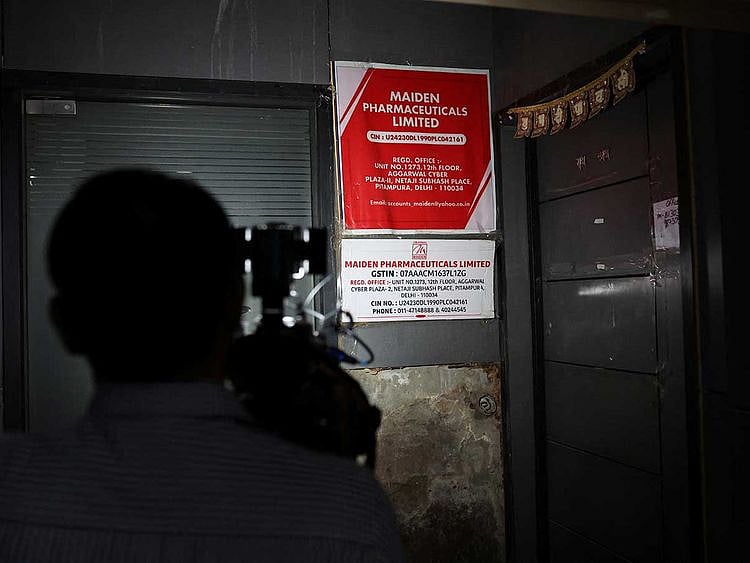Cough syrup, deaths and Indian pharma
India, world’s largest provider of generic medicines, has a formidable pharma industry

A tragedy in Africa has once again opened the lid on pharma regulations in India. Gambia says 70 children have now died after drinking a contaminated cough syrup made by the manufacturer Maiden Pharmaceuticals Limited in Haryana.
Production at the plant has been stopped after a government check revealed ‘12 flaws,’ an inspection done only after the cat was out of the bag.
WHO has flagged four Indian made cough syrups as substandard with more than a suspicion that they contain the common toxic compounds diethylene glycol and ethylene glycol which when ingested have lethal repercussions, in children they are believed to be fatal.
The pieces are beginning to fit. Twelve children who died in Jammu in late 2019 are suspected to have lost their lives after taking a cough syrup contaminated with the same lethal chemicals in it. Diethylene glycol is a solvent used commonly in resins, dyes and in industrial products like lubricants.
The chemical causes acute kidney failure but just how nonchalantly the issue of spurious medicines is treated in the country can be gauged by the fact that almost three years later no FIR has been filed in the matter in Jammu.
It isn’t hard to comprehend why despite setbacks like Gambia these products continue to flood the market. Without prescription the medicines have a quicker route to the consumer, most unaware of how to differentiate genuine drugs from the spurious ones.
Cheaper manufacturing cost transfers to the buyer who doesn’t question why a syrup bottle is being sold without the conventional box packaging.
Industry body Assocham in a paper a few years ago reported that 25% of drugs sold in India are adulterated or of a sub- par quality, among those red flagged were common everyday medicines like Crocin and Betadine.
Fake drug manufacturing industry
Assocham had warned that by 2017, the fake drug manufacturing industry would cross $10 billion in an Indian market that stands at $24 billion with upward projections. Inadequate regulations combined with the paucity of qualified drug inspectors allow for this industry to flourish unregulated.
Unfortunately, drug quality regulation has not been given the priority it deserves, with long standing rumours of ingredients that shouldn’t slip in, slipping in. There is more. What happens inside some of these lab facilities stays there, as the high profile Ranbaxy case exposed.
One of India’s largest pharmaceutical company Ranbaxy in a landmark case in 2013 agreed through Ranbaxy USA to pay a fine of $500 million after pleading guilty to knowingly making false statements to the US Food and Drug Administration.
Three counts of felony had been slapped against the company including accusations of falsifying data and substandard manufacturing practices. Ranbaxy admitted that incomplete testing records had been discovered during inspection of one of its testing facilities.
While Ranbaxy was finally caught in the net, unobtrusive factories continue their work in small towns, unfettered and unpunished. What also allows spurious drugs to go unchecked into the market is inadequate law enforcement as seen in Jammu where there has still been no accountability for a dozen deaths. Penalties are monetary and once paid, it is back to business.
Earlier in the summer, drug controller from the state of Telengana flagged Thyronorm, one of the most widely used medicines in the country for hypothyroidism under the ‘not of standard quality’ list.
Counterfeit drugs in the market
The controller also reported that there was a discrepancy between the labelling of the dosage and the actual composition. The makers, Abbott India Ltd say the sample tested was itself fake and the company had previously complained about the counterfeit drugs sold in the market.
Dinesh Thakur, the whistle-blower in the Ranbaxy case in a recently co-authored article in The Guardian writes that a database hosted by the Indian government lists more than 8000 drugs that have failed quality tests adding that while not all would lead to death, they would have severe health implications.
In response to the recent deaths in Gambia, the Indian government says that ‘the clinical features and the treatment received from the WHO has been inadequate to determine the aetiology.’
Experts say India needs to own the debacles to maintain its claim of being the ‘pharmacy of the world’ and that the buck stops with the centre since states only have licencing authority.
India is the largest producer of generic pharmaceuticals in the world and 20% of global exports of generic drugs originate in India.
Setbacks such as Gambia put India’s global achievements in conflict, on one hand Adar Poonawala’s Covid vaccine success while on the other, an everyday cough syrup that causes a child to lose his life. A dichotomy that cannot exist together.
Network Links
GN StoreDownload our app
© Al Nisr Publishing LLC 2026. All rights reserved.